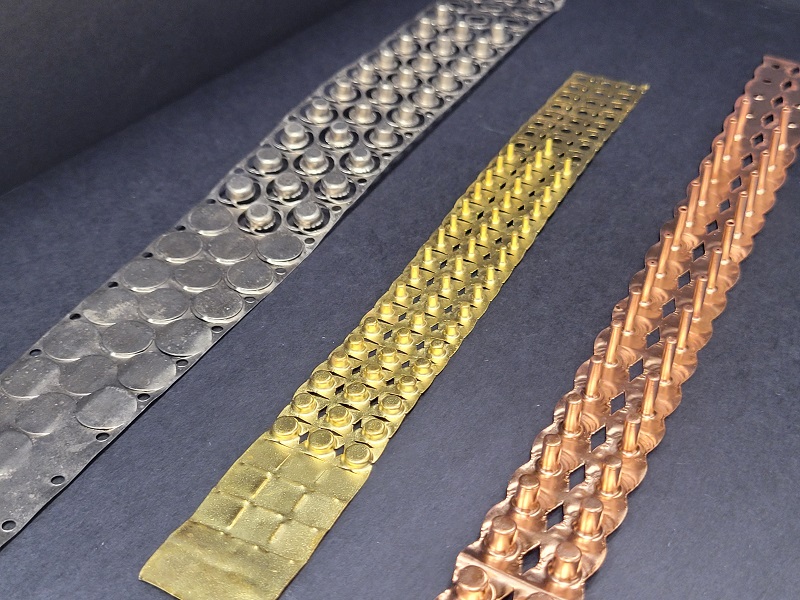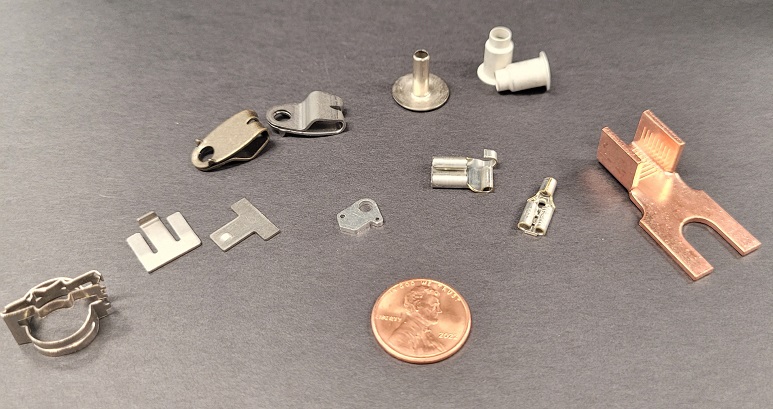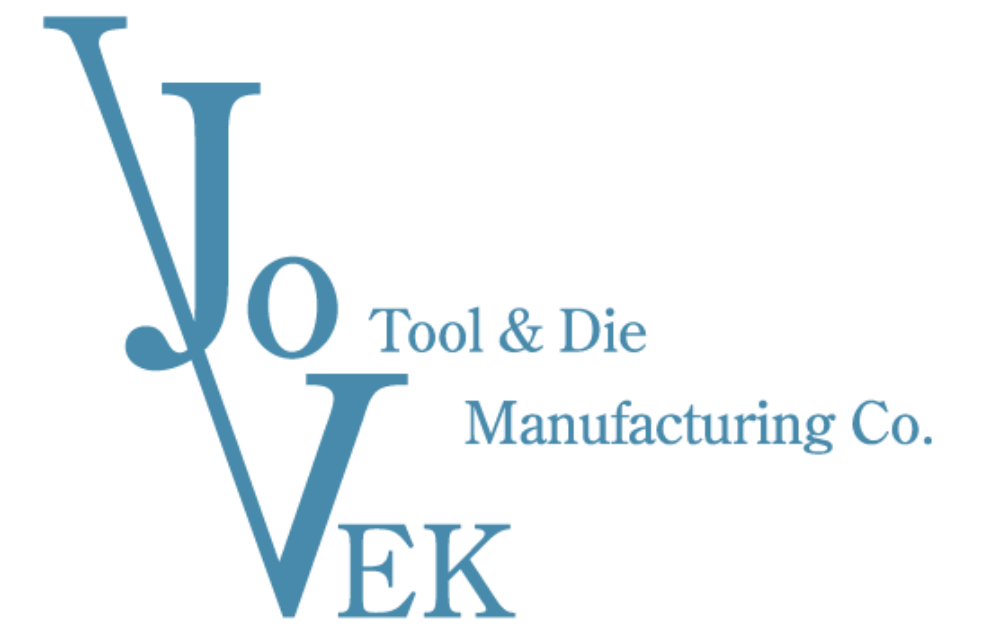Understanding Progressive Stamping
In the realm of precision manufacturing, progressive stamping stands as a remarkable and widely adopted technique. It’s a process that has revolutionized the production of intricate metal parts, making it an integral component of various industries, including automotive, electronics, aerospace, and more. In this comprehensive article, we delve into the world of progressive stamping, exploring its fundamentals, applications, advantages, and why it’s a key specialty at Jo-Vek Tool & Die Manufacturing.

What Is Progressive Stamping?
Progressive stamping is a versatile and efficient metalworking process used to manufacture a wide range of components from metal coils. It’s especially suitable for creating parts that demand precision, repeatability, and high-volume production. At its core, progressive stamping involves a series of coordinated stamping and forming operations that are executed progressively along a metal strip. As the strip advances through a stamping Die in a power Press, it undergoes various operations, ultimately transforming it into a finished part.
How Does Progressive Stamping Manufacturing Work?
The progressive stamping process typically begins with a coil of metal, usually steel or aluminum or any type of copper or brass which is unwound and fed into the stamping tool in a power press. As the metal strip progresses through the tool, a series of individual dies perform various tasks, such as cutting, punching, bending, coining, and embossing.
Here’s a simplified breakdown of the steps involved:
- Blanking: The first station cuts the metal strip into flat pieces, also known as blanks, each representing the shape of the final part.
- Piercing: Subsequent stations may punch holes or create openings in the blanks as required by the design.
- Bending: Stations equipped with bending dies shape the blank into the desired form. These can range from simple bends to complex geometries.
- Drawing: For components that need depth, like cups or shells, drawing dies creates the desired three-dimensional shapes.
- Coining: Coining stations fine-tune the dimensions and surface finish of the part, ensuring precise specifications are met.
- Progressive Transfer: In cases where several separate pieces need to be assembled together, transfer mechanisms move the blanks between various stations.
- Final Trimming: The last station trims any excess material, leaving behind a clean, finished part.
Why Progressive Stamping?
Progressive stamping offers several significant advantages, making it a preferred method for manufacturing complex, high-precision metal components:
- High Efficiency: Progressive stamping is a continuous process, allowing for high-speed production. This efficiency is vital for meeting the demands of industries that require large quantities of parts.
- Cost-Effective: Due to its speed and the ability to process multiple steps in a single pass, progressive stamping often results in lower production costs compared to other manufacturing methods.
- Precision and Consistency: The process ensures exceptional precision and consistency in part dimensions, crucial for applications where even minor variations are unacceptable.
- Reduced Material Waste: The progressive stamping process optimizes material usage, minimizing waste, which is not only environmentally responsible but also cost-effective.
- Complex Geometry: It can accommodate the production of parts with intricate shapes and details that might be challenging to achieve with other methods.
- Scalability: Progressive stamping can easily scale to meet the demands of high-volume production, making it ideal for automotive and electronics industries.

Manufacturing Applications of Progressive Stamping
Automotive Industry Manufacturing
Progressive stamping is a linchpin in the automotive industry. It’s responsible for the creation of numerous components, including:
- Brackets: Used for mounting various vehicle parts.
- Clips and Fasteners: Essential for securing panels and parts.
- Connectors: Vital for electrical systems.
- Terminals: Used in wiring harnesses.
- Housings: For electronic control units (ECUs) and sensors.
- Brake Components: Such as caliper brackets.
- Transmission Parts: Including clutch plates and gears.
Electronics Industry Manufacturing
In the electronics sector, progressive stamping plays a critical role in manufacturing components like:
- Lead Frames: Essential for semiconductor packaging.
- Connector Pins: Used in various electronic devices.
- Shielding Components: To protect sensitive electronics from interference.
- Battery Contacts: For a wide range of devices.
- Terminals: For printed circuit boards (PCBs).
Aerospace Industry Manufacturing
The aerospace industry relies on progressive stamping to produce intricate components with high precision. These components include:
- Mounting Brackets: Used for securing various systems in aircraft.
- Clips and Fasteners: For securing panels and access doors.
- Washers and Spacers: Essential for structural integrity.
- Housings: For electronic components in avionics.
- Connector Components: Vital for communication systems.
Medical Devices Manufacturing
In the medical field, precision is paramount. Progressive stamping helps manufacture components like:
- Surgical Instruments: Such as forceps and scissors.
- Implantable Devices: Including components for pacemakers and artificial joints.
- Dental Components: Such as brackets and braces.
- Diagnostic Equipment Parts: Like brackets and frames.
The Jo-Vek Advantage in Progressive Stamping
At Jo-Vek Tool & Die Manufacturing, we take pride in our expertise in progressive stamping. Our commitment to excellence and precision has made us a preferred partner for clients across various industries. Here’s why you can count on us:
State-of-the-Art Equipment: We invest in cutting-edge stamping presses and die technologies to ensure that every component we produce meets the highest standards of quality and precision.
Skilled Workforce: Our team comprises skilled toolmakers, engineers, and technicians who have years of experience in progressive stamping. They understand the nuances of the process and can troubleshoot and optimize it for the most complex parts.
Quality Control: Our commitment to quality control is unwavering. We employ rigorous inspection and testing processes to ensure that each part meets or exceeds the specified tolerances and requirements.
Custom Solutions: We understand that every project is unique. We work closely with our clients to develop custom progressive stamping solutions tailored to their exact needs, whether it’s a small prototype run or a high-volume production.
Material Expertise: We work with a wide range of materials, including various grades of steel, aluminum, and specialty alloys. Our material expertise allows us to choose the right material for each application.
Environmental Responsibility: We are committed to sustainable manufacturing practices and responsible material usage, minimizing waste and environmental impact.
On-Time Delivery: We understand the importance of meeting deadlines. Our streamlined processes and project management ensure that your components are delivered on time, every time.
When precision matters, trust Jo-Vek for your progressive stamping needs.
Progressive stamping is a versatile and efficient manufacturing process that has transformed the production of small and intricate metal components. It finds applications across a wide range of industries, from automotive and electronics to aerospace and healthcare. At Jo-Vek Tool & Die Manufacturing, we take pride in our expertise in progressive stamping, offering custom solutions that meet the highest standards of quality and precision.
For more information on our progressive stamping capabilities and how we can assist with your projects, visit www.jo-vek.com or contact our team.
